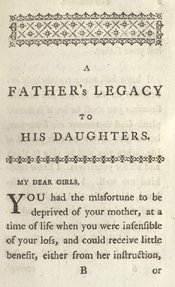This was originally published in February 2012 as part of our Item of the Month series.
In the month of February our thoughts often turn to affairs of the heart. Here we take a peek at an eighteenth-century father’s advice to his daughters concerning manners, friendship, love and matrimony.
Born in Aberdeen, Dr John Gregory (1724–1773) studied medicine at the Universities of Edinburgh and Leiden and subsequently became Professor of the Practice of Physic at Edinburgh. In the course of a successful medical career, he published several important works including ‘A Comparative View of the State and Faculties of Man, with those of the Animal World’ (1765) and ‘Observations on the Duties and Offices of a Physician and on the Method of Prosecuting Enquiries in Philosophy’ (1770).
Following the death of his wife, Elizabeth, in 1761, John Gregory wrote a different sort of book: a little volume of advice and guidance for the couple’s two young girls. He never intended ‘A Father’s Legacy to his Daughters’ for publication, but merely to serve as the ‘last mark of [their]…father’s love and attention’, in which he exhorted the girls to cultivate ‘the most perfect simplicity of heart and manners…dignity without pride, affability without meanness, and simple elegance without affection.’ However, a year after Gregory’s death, his son James published the volume, which became an instant success. The text has since gone through several editions and been translated into various languages. The excerpts below are taken from the London edition of 1781, a copy of which is held in the Anderson Collection.
Gregory on socialising:
- Wit is the most dangerous talent you can possess. It must be guarded with great discretion and good-nature, otherwise it will create you many enemies.
- The great art of pleasing in conversation consists in making the company pleased with themselves.
- Consider every species of indelicacy in conversation, as shameful in itself, and as highly disgusting to us. All double entendre is of this sort.
- Have a sacred regard to the truth. Lying is a mean and despicable device.
Gregory on dress:
An elegant simplicity is an equal proof of taste and delicacy.
Gregory on men and marriage:
- Procure from your friends every necessary piece of information concerning him; such as his character for sense, his morals, his temper, fortune, and family; whether it is distinguished for parts and worth, or for folly, knavery, and loathsome hereditary diseases.
- Do not marry a fool; he is the most intractable of all animals; he is led by his passions and caprices, and is incapable of hearing the voice of reason.
- A rake is always a suspicious husband, because he has only known the most worthless of your sex.
Gregory on letting a man down gently:
… treat him honourably and humanely. Do not let him linger in a miserable suspense, but be anxious to let him know your sentiments with regard to him.
Gregory on love:
- Before your affections come to be in the least engaged to any man, examine your tempers, your tastes, and your hearts, very severely, and settle in your own minds, what are the requisites to your happiness.
- Love is very seldom produced at first sight; at least it must have, in that case, a very unjustifiable foundation.
- True love is founded on esteem, in a correspondence of tastes and sentiments, and steals on the heart imperceptibly.
- Genuine love is not found in caprice; it is founded in nature, on honourable views, on virtue, on similarity of tastes and sympathy of souls.
Search #loveheritage on twitter to discover more stories of love in archives, libraries and museums this St. Valentine’s Day.
Carol Stewart, Senior Library Assistant

